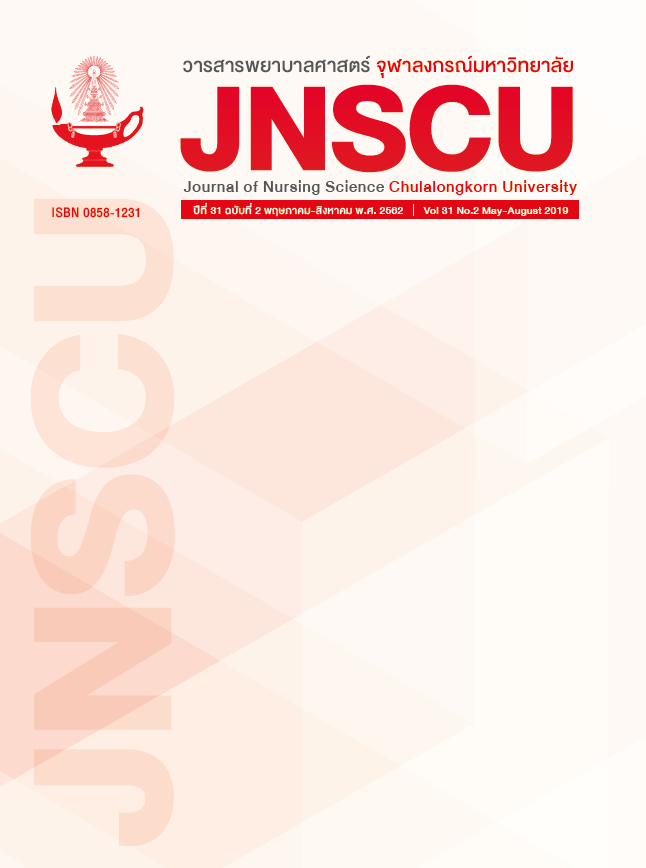ประสบการณ์ชีวิตของบุตรชายที่เป็นผู้ดูแล บิดา มารดาสูงอายุภาวะพึ่งพิง
คำสำคัญ:
ประสบการณ์ชีวิตของบุตรชาย, บุตรชายผู้ดูแลบิดา มารดาสูงอายุภาวะพึ่งพิงบทคัดย่อ
วัตถุประสงค์: เพื่อบรรยายประสบการณ์ชีวิตของบุตรชายที่เป็นผู้ดูแลบิดา มารดาสูงอายุภาวะพึ่งพิง
รูปแบบการวิจัย: วิจัยเชิงคุณภาพแบบปรากฏการณ์วิทยาของ Heidegger
วิธีดำเนินการวิจัย: ผู้ให้ข้อมูล คือ บุตรชายที่มีประสบการณ์ในการดูแลบิดา มารดาสูงอายุภาวะพึ่งพิง
เขตกรุงเทพมหานคร เก็บรวบรวมข้อมูลโดยการสัมภาษณ์เชิงลึก บันทึกเทป วิเคราะห์ข้อมูลตามวิธีของ
Van Manen ข้อมูลอิ่มตัวจากผู้ให้ข้อมูล จำนวน 12 ราย
ผลการวิจัย: ประสบการณ์ชีวิตของบุตรชายที่เป็นผู้ดูแลบิดา มารดาสูงอายุภาวะพึ่งพิง ประกอบด้วย
5 ประเด็นหลัก คือ 1) ชีวิตที่เปลี่ยนแปลงไป ต้องปรับสมดุลการทำงานเข้ากับการดูแล มีข้อจำกัดในการ
เข้าสังคมและเวลาส่วนตัวมากขึ้น 2) ปรับตัว ปรับใจ ยอมรับบทบาทการเป็นผู้ดูแล โดยการมองโลกในแง่บวก
ขจัดอารมณ์ความรู้สึกด้านลบ เข้าใจและยอมรับอาการแสดงของโรค 3) การดูแลที่ทำได้ทั้งชายหญิง คือ
เมื่อปรับตัวได้ การดูแลไม่ยาก และบุตรชายมีความแข็งแรงในการอุ้มพยุง แม้ไม่ถนัดงานละเอียดแต่สามารถ
ดูแลได้ เพราะถ้าใส่ใจดูแลได้ทั้งชายหญิง 4) เรียนรู้วิธีการดูแล เนื่องจากช่วงแรกไม่มั่นใจในการดูแล จึงต้อง
วางแผน ปรับเปลี่ยนวิธีการดูแลให้เหมาะสม และขอความช่วยเหลือจากผู้อื่น 5) ความสุข ความทุกข์จาก
การเป็นผู้ดูแล ความสุข คือ การมีความสุข ภาคภูมิใจที่ได้ดูแลและตอบแทนบุญคุณบุพการี การได้รับ
คำชื่นชม ความทุกข์ คือ เหนื่อยและเครียดจากการดูแล กังวลค่าใช้จ่ายที่เพิ่มขึ้น
สรุป: ผลการวิจัยนี้ นำมาเป็นข้อมูลพื้นฐานให้บุคลากรทางสุขภาพ ส่งเสริม สนับสนุนบุตรชายผู้ดูแล ให้มี
ความมั่นใจและปฎิบัติการดูแลบิดา มารดาสูงอายุภาวะพึ่งพิงได้อย่างเหมาะสม
เอกสารอ้างอิง
Jitapunkul S, Kunanusont C, Phoolcharoen W,SuriyawongpaisalP. HealthProblems of Thai elderly. Bangkok: The Thai Health Research Institute, National Public HealthFoundationand Officeof Public Health Policies and Plans. Nonthaburi: Ministry of Public Health; 1999.
Sihapark S, Chuengsatiansup K, Tengrang K. The effects and caregiving burdens of older persons in long-term care based on Thai culture. Nonthaburi: Health SystemsResearchInstitute(HSRI);2014.
Yodpet S. Caregivers for the Elderly in the Family. In: A forumfor brainstormingon policy issues. Care and service system for the elderly. Bangkok: Chulabhorn Research Institute; 2009. p.1-9.
Archavanitkul K. Sexuality transition in Thai society. In: Punpuing S, Sunpuwan M, editors. Thailand’s population in transition:aturning point forThaisociety. NakhonPathom: InstituteforPopulation and SocialResearch, Mahidol University; 2011. p. 43-65.
Prasatkul P, Rittirong J, Chuanwan S, Kanchanachitra M, Katewongsa P, Thianlai K, et al. Situation of the Thai
Elderly 2014. Bangkok: Amarin Printing & Publishing; 2015.
Robinson CA, Bottorff JL, Pesut B, Oliffe JL, TomlinsonJ.Themalefaceofcaregiving: A scoping review of men caring for a person with dementia. Americanjournal of men’s health 2014;8(5):409-26. doi: 10.1177/1557988313519671.
Mc Donnell E, Ryan A. Male caregiving in dementia: A review and commentary.Dementia 2013;12(2):238-50. doi: 10.1177/1471301211421235.
Grigorovich A, Rittenberg N, Dick T, McCann A, Abbott A,Kmielauskas A,et al.Roles and coping strategiesof sons caring for a parent with dementia. American Journal of Occupational Therapy 2016;70(1):1-9. doi: 10.5014/ajot.2016. 017715.
Thongmanas,TharawanK.Experienceofmen as caregivers in Thai society [Master thesis, Medical and health social science program in social sciences and humanities].Bangkok:MahidolUniversity; 2012.
Sanders S, Power J. Roles, responsibilities, and relationshipsamongolderhusbands caring for wives with progressive dementiaand otherchronicconditions. Health & Social Work2009;34(1):41-51.doi: 10.1093/hsw/34.1.41.
Bem SL. Gender schematheory: A cognitive account of sex typing. Psychological review 1981;88(4): 354-64. doi.org/ 10.1037/0033-295X.88.4.354
Grant JS, Glandon GL, Elliott TR, Giger JN, Weaver M. Caregiving problems and feelingsexperienced byfamilycaregivers of strokesurvivors thefirst monthafter discharge. International Journal of Rehabilitation Research 2004; 27(2): 105-11.
HirunchuhaS, Chuaprapaisilp A,Taboonpong S,KhampalikitS. Developmentofacare model for the caregivers of stroke patients at home [Doctoral thesis, PhilosophyProgramin NursingScience]. Bangkok: Mahidol University; 1998.(In Thai)
TrakunvongB.Socialsupport tosolve public health problems. Bangkok: Samdee Printing; 1985.
Yodphet S, Sombat L, Choktanawanit P, Sakdaphon T. Good models on the elderly care by family and community in rural areas in Thailand. J Gerontol Geriatr Med 2009;10(3):13-24.



